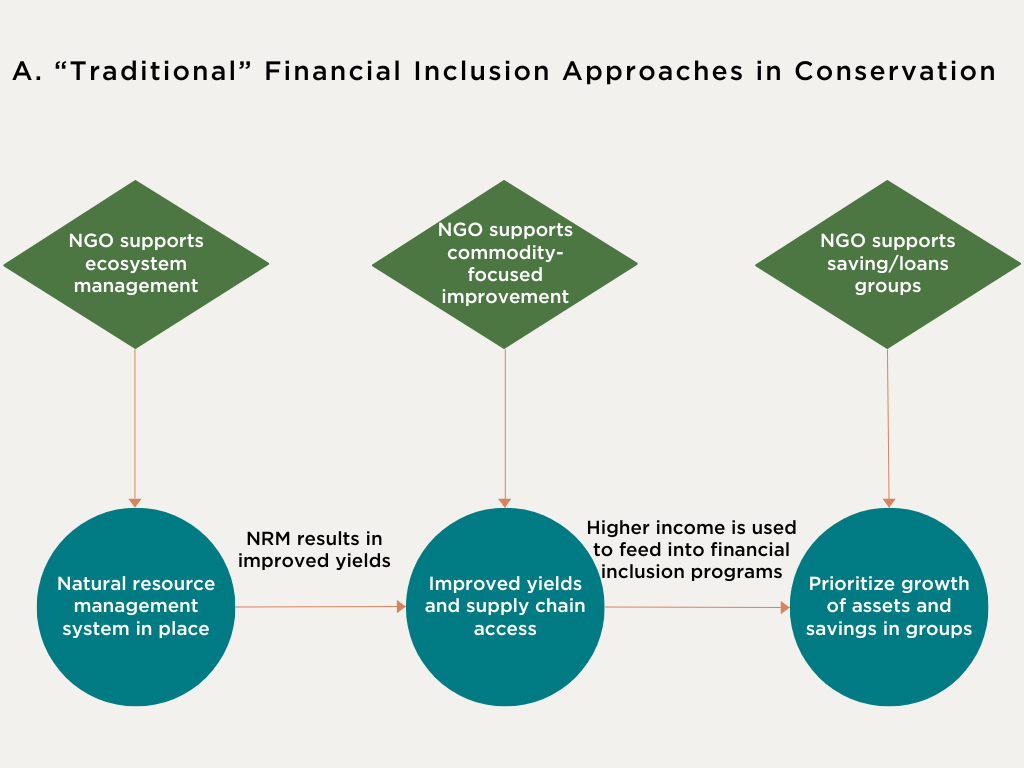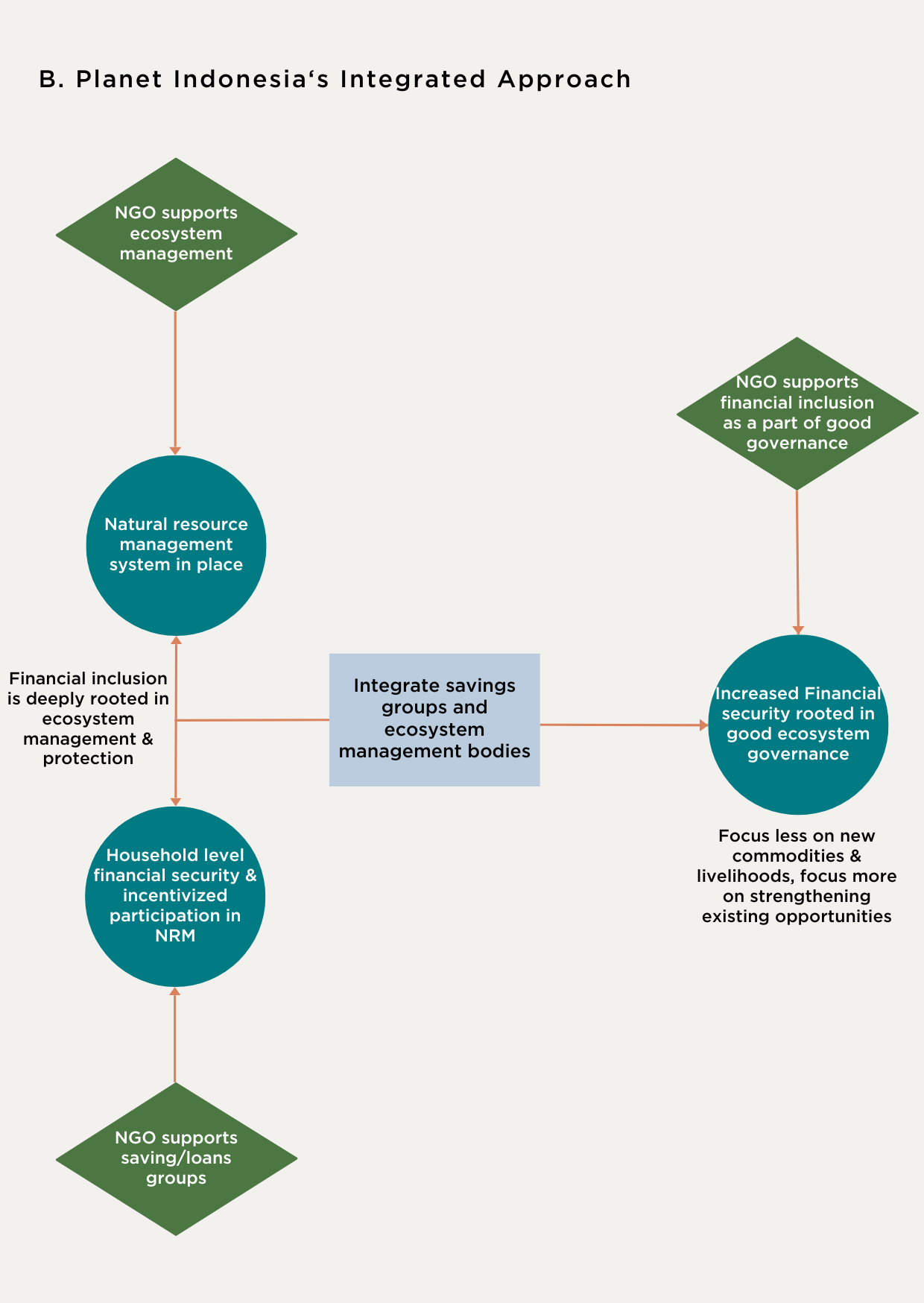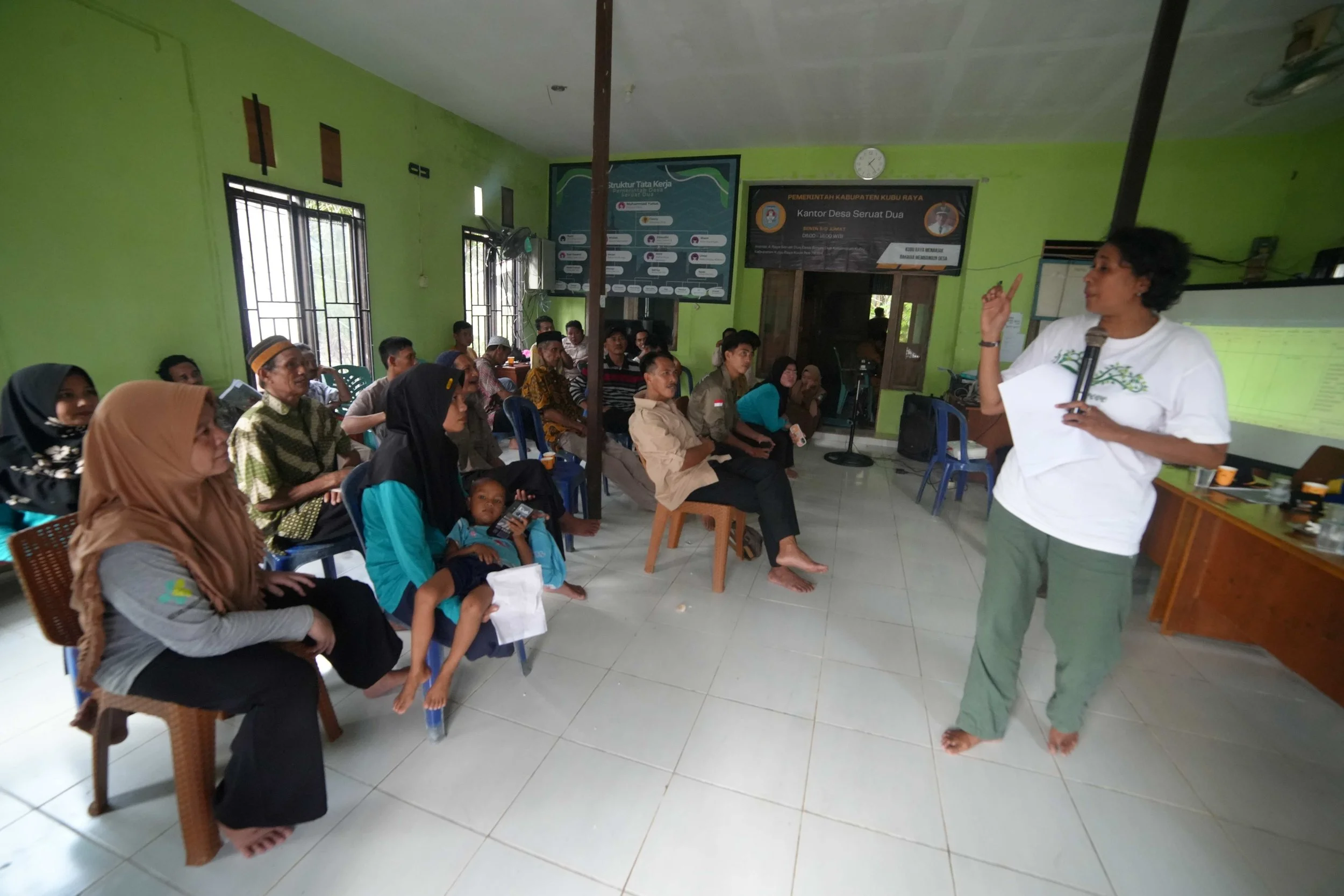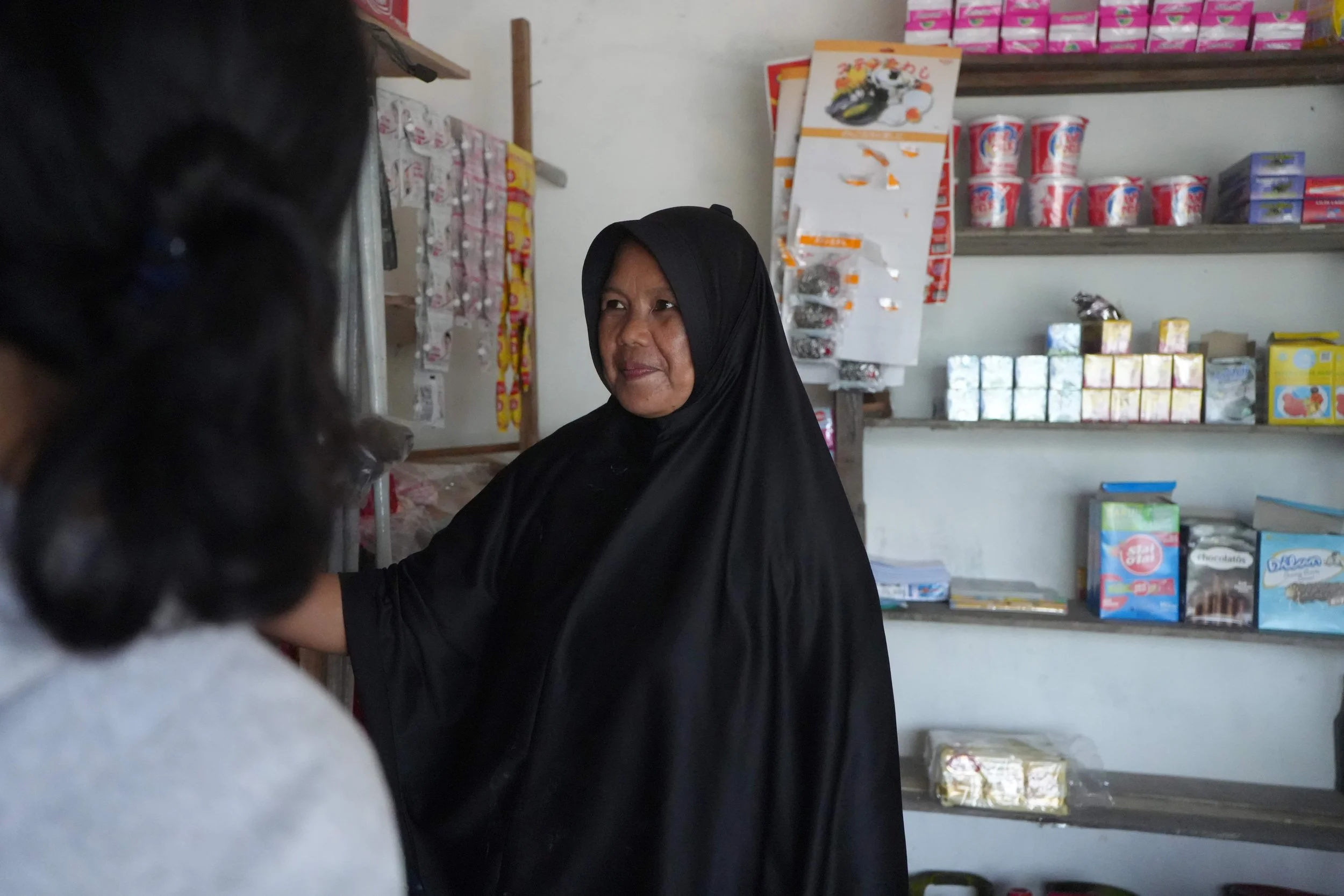Financial Inclusion as the ‘Alternate’ to the Alternative Livelihood Approach in Conservation
By Adam Miller, Putri Damatashia, Novia Sagita
Welcome to the second part of our series on financial inclusion and its critical role in conservation. In this installment, we delve into why financial inclusion can be a sustainable alternative to traditional livelihood approaches in conservation. Learn how savings and loan groups empower communities, build resilience, and promote sustainable practices. Read part one here.
Savings and Loans Business Services from the Conservation Cooperative (PUMK) in Ladak.
In recent years, alternative livelihoods have gained significant popularity in conservation programs worldwide. These approaches often aim to reduce the dependency of local communities on natural resources that are threatened or endangered, moving people away from an ‘at-risk’ resource.
By offering alternative income-generating opportunities, such as ecotourism, sustainable agriculture, or handicrafts, conservation initiatives attempt to foster economic diversification and social development while promoting environmental conservation. However, we argue that ‘alternative’ livelihoods are often tricky, context-specific, require ‘subsidies’ from non-profits to sustain them, and are even more challenging to scale.
Small-scale fishers and farmers play a crucial role in frontline resource management.
Alternative livelihood programs in conservation often fail and are difficult for several reasons. One is that such programs may not provide sufficient income to replace the livelihoods that are being lost due to conservation efforts. When they do or can provide sufficient income, they are often subsidized by grant funding to cover ongoing operational costs met by beneficiaries.
Another reason alternative livelihood programs in conservation may fail is that they may not consider the social and cultural context of the communities they are meant to benefit. For example, a study of a conservation program in Tanzania found that the program's focus on beekeeping as an alternative livelihood did not consider the fact that beekeeping was traditionally seen as a low-status activity in the community³. This led to low participation in the program and a lack of interest in beekeeping as a livelihood option.
Community members participating in a financial meeting
We argue financial inclusion through savings/loans groups can be a replacement for alternative livelihoods and a better option in community-centered conservation for several reasons Here are four:
Firstly, these initiatives provide access to financial services for underserved households and don’t just focus on introducing new commodities or sources of income.
This access to financial services can help individuals and communities build resilience and improve their economic well-being without overly focusing on identifying new income-generating activities, which requires investment in training in the new livelihood, supply chain mapping, and bargaining to ensure resource-users can:
actually, do the new livelihood,
actually produce something, and
actually, find a buyer to purchase it (and at a fair price!)
Secondly, participating in savings/loans groups can allow individuals to diversify their income sources themselves, reducing their dependence on a single livelihood activity. True to SDT theory, it allows communities to improve autonomy.
Thirdly, financial inclusion and savings/loans groups can help communities build financial resilience in the face of crises or economic shocks. Access to savings and insurance services provides a safety net during difficult times, while access to local capital helps individuals and communities recover and rebuild their livelihoods after a crisis. This adds an extra layer of security that alternative or diversification projects can’t provide.
Finally, financial inclusion programs can be integrated into governance bodies, local institutions, and natural resource governance approaches, allowing for there to be a strong link between household financial management and resource management.
This last point is critical to Planet Indonesia’s approach. Figure A shows how financial inclusion is often positioned in conservation programs. We have experienced that this can promote exploitation and uses a capitalistic approach where increased economic security comes from higher yields e.g., taking more.
Figure A.
While Planet Indonesia works to improve farmer yields and restore coastal fisheries, it is imperative that environmental safeguarding be put in place so that financial inclusion work does not undo conservation success. Conservation - financial inclusion often can work against one another if the link is not established and integrated. Figure B shows how Planet Indonesia integrates financial inclusion and ecosystem management into governance bodies.
Figure B.
The impact of our approach to financial inclusion and resilience has been well documented. In Novick et al. 2022, we found that illegal logging, poaching, and land clearing were negatively correlated with group assets, savings, and loans. The same study also used a most significant change methodology and found that many smallholder farmers in the Gunung Nyiut Nature Reserve felt the most significant change in their lives was the ability to save funds securely, locally, and quickly access start-up capital.
In Gunung Nyiut, women linked access to zero-interest loans as a major factor in improving community health. In times of need, communities could easily access funds to pay for unmet healthcare bills.
In 2022, we also conducted participatory impact assessments across all of Gunung Nyiut and Kubu Raya - two of our key terrestrial and marine project sites. While the data is still being analyzed and prepared for publication, financial security (savings, loans, community grants) was identified as a critical driver of positive change across multiple outcomes.
In Gunung Nyiut, women linked access to zero-interest loans as a major factor in improving community health. In times of need, communities could easily access funds to pay for unmet healthcare bills. In the same site, community members also linked improved access to financial services as a significant cause for reduced deforestation - explaining that their reduced dependency on unfavorable high-interest financial services leads to environmental exploitation.
Community members participating in developing an adaptive resource management plan in Kubu Raya.
In Kubu Raya, for small-scale fishers, similar results were found. Fishers identified financial security as an activity area that strongly influenced improved healthcare, education, livelihood, and overall community governance.
Conclusion
At Planet Indonesia, we are driven by a passion for community-led and community-centered conservation and a belief that engaging solutions from local resource users is the key to a sustainable and thriving future. Small-scale fishers and smallholder farmers play a crucial role as frontline resource managers, and their well-being is inherently tied to the health of the ecosystems they rely on. However, financial exclusion and the resulting debt cycles have been formidable barriers to their empowerment and the conservation of natural resources.
As we have witnessed, the detrimental impact of debt cycles on both people and the environment cannot be overlooked. Limited access to finance, high debt burdens, and vulnerability to financial stress all hinder these resource users' ability to invest in sustainable practices, perpetuating a negative cycle.
Yet, we remain steadfast in our commitment to addressing these challenges and seeking innovative solutions. We firmly believe that financial inclusion, integrated into the very fabric of community governance, can break this cycle and unlock a brighter future for local communities and their environment.
Through our financial resilience groups, we have embraced a novel approach that differs significantly from traditional financial inclusion models. By centering on autonomy, competence, and relatedness - the pillars of Self-Determination Theory - we seek to empower small-scale fishers and smallholder farmers to take charge of their financial decisions, build confidence in managing their resources, and foster strong social connections that promote collective problem-solving.
The potential of financial inclusion as an alternative to traditional livelihood approaches in conservation cannot be overstated. Unlike the often challenging and context-specific alternative livelihood programs, our approach provides financial security and resilience, enabling individuals to diversify their income sources. By linking financial inclusion with resource management and governance, we can establish a powerful connection that ensures economic security and environmental safeguarding go hand in hand.
However, our journey is far from over. As we continue to expand our reach and strengthen our impact, we recognize that there is much to learn, adapt, and innovate. Our commitment to research and participatory assessments allows us to refine our approach and ensure it remains relevant, culturally appropriate, and sustainable.
A community member proudly running her small grocery store, contributing to local economic development.
With a firm belief in the potential of financial inclusion, we stand together with our community partners, stakeholders, and supporters to forge a path toward a more inclusive, resilient, and balanced future. A future where small-scale fishers and smallholder farmers are not burdened by debt cycles but empowered to safeguard their resources and contribute to the well-being of our planet.
Together, we can create a powerful ripple effect, transforming lives and landscapes, one resilient community at a time.
Learn about financial inclusion principles
References:
1. Holmes, G., & Sandbrook, C. (2016). Conservation and development interventions as networks: Implications for evaluating the impact of conservation on social-ecological systems. Global Environmental Change, 37, 114-123. doi: 10.1016/j.gloenvcha.2016.01.004
2. Rakotonarivo, O. S., Schaafsma, M., Hockley, N., Mandimbiniaina, R., & Jones, J. P. (2017). Conservation and livelihood outcomes of community forest management in Madagascar. Conservation Biology, 31(1), 55-65. doi: 10.1111/cobi.12797
3. Mwampamba, T. H., & Chhetri, B. B. (2015). Community-based forest management and livelihoods in Tanzania: An analysis of policy and practice. Environment, Development and Sustainability, 17(4), 795-814. doi: 10.1007/s10668-014-9608-5
Citations:
[1] https://www.frontiersin.org/articles/10.3389/fsufs.2019.00003/full
[2] https://www.ers.usda.gov/amber-waves/2019/october/larger-farms-and-younger-farmers-are-more-vulnerable-to-financial-stress/
[3] https://www.fao.org/3/i5251e/i5251e.pdf
[4] https://sustainabledevelopment.un.org/content/unsurvey/attachments/IFAD_and_the_2030_Agenda.pdf
[5] https://www.cell.com/trends/ecology-evolution/fulltext/S0169-5347(23)00037-X
[6] https://agricultureandfoodsecurity.biomedcentral.com/articles/10.1186/s40066-017-0109-5
If you have any questions please reach out via admin@planetindonesia.org. Sign up for our newsletter and follow us on our social media Facebook here, Instagram here, and LinkedIn here to get timely updates on our activities, an insider’s look into the lives of front-line conservationists, and ongoing programs.








